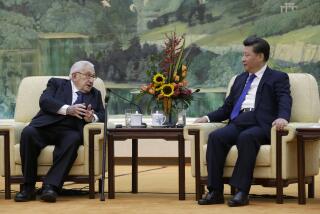Two Old Pros Face the S. African Gale : Kissinger and Carrington will seek to mediate
- Share via
Now that just about everything else has failed to resolve the political impasse and stop the mounting body count in South Africa, two internationally respected diplomats, Henry A. Kissinger and Britain’s Lord Peter Carrington, will try their experienced hands. Just another desperate grasp for peace in South Africa? Maybe. But it’s definitely worth a try, given the way the unexpected has come to happen lately in that troubled nation.
Kissinger and Carrington will mediate at the request of the Transitional Executive Council, currently the governmental decision-making body, and with permission from President Frederik W. de Klerk and Nelson Mandela, the heir apparent to the presidency. They will need more than good luck to entice the powerful Zulu minority to put down its weapons and participate in the April 26-28 balloting, which is certain to elect its hated rival, Mandela.
CREDENTIALS GALORE: Although he had little to show for his role in the European Union peace conference on Bosnia, Carrington, a former British foreign minister, is knowledgeable about Africa and enjoys credibility in the region. In neighboring Zimbabwe, he brokered a similar impasse, ending the Rhodesia war and allowing the transition from a white-dominated British colony to a black-run country. Kissinger, former U.S. secretary of state, has a large and deep foreign affairs portfolio.
De Klerk and Mandela are scheduled to meet on Friday with the power-hungry Zulu chief Mangosuthu Gatsha Buthelezi, who heads the small but potent Inkatha Freedom Party, and the figurehead Zulu king, Goodwill Zwelethini. The Zulu leaders want an independent nation that would be heavily subsidized by the government. Allowing a Zulu secession would Balkanize South Africa and encourage conservative whites in their own campaign for independence.
As the Zulu leaders talk, their fanatical adherents live under a government state of emergency, imposed by De Klerk--ironically, with Mandela’s blessing. Mandela’s followers, supporters of his powerful African National Congress, once fought a similar state of emergency that the white minority government imposed in trying to stall the drive toward democracy.
WEIRD LANDSCAPE: Currently, state security forces are on patrol in Natal province, which includes the quasi-independent Zulu homeland, KwaZulu. Once again, the topsy-turvy politics of South Africa are evident. According to the independent Goldstone Commission, established by De Klerk, several senior security leaders colluded with Zulu forces and provided them with sophisticated arms to do battle with the ANC. The police now must walk a fine line, containing the Zulus without triggering a monstrous blood bath.
Who would have thought that Mandela would support a state of emergency declared by the government, or that police forces once secretly allied with the Zulus would face them as opponents? The unpredictability of the political winds in South Africa may be Kissinger and Carrington’s best ally.
More to Read
Sign up for Essential California
The most important California stories and recommendations in your inbox every morning.
You may occasionally receive promotional content from the Los Angeles Times.













